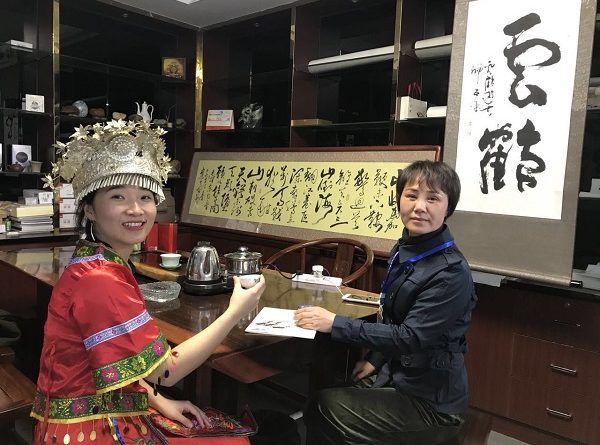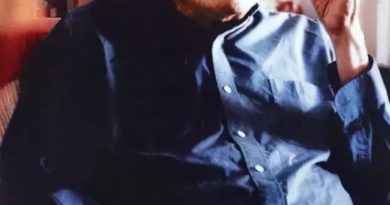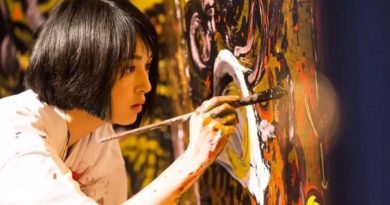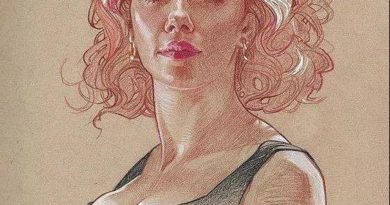”何须浅碧深红色,自是花中第一流”——视觉艺术创作者朱晓晴专访

朱晓晴现在一边在美国念视觉专业的研究生课程,一边往返于北京和纽约之间做艺术,了解到她喜欢艺术,也创作出了诸如“早上5点”、“相互丈量”以及“过去曾是未来”等不少作品,适逢她今年刚好来珠海渡假过春节,便对她进行了简短的采访。
王萌:朱晓晴你好,我是《国际艺术新闻网》的记者王萌,今天很高兴见到你。你可以先介绍一下自己吗?
朱晓晴:我出生和成长于北京。父母都是南方人,他们相识于中央民族大学,毕业以后他们留在北京工作。我们经常回南方老家。我喜欢南方的食物和自然风光,也爱北京的繁华和历史文化。我基本上算是生活在北京的南方人。
王萌:你是怎样走上艺术之路的?家里是否有其他人从事艺术方面的工作?
朱晓晴:我在艺术上的启蒙老师是我的父母。他们两个人都从事与艺术相关的职业,爸爸之前在出版社工作,同时是版画和水彩画家。妈妈也是画家,同时经营一家画廊。小的时候家里总是有人在画画,我跟着模仿,久而久之就喜欢上画画。我家除了我们三个以外,还有我的弟弟也喜欢艺术,他正在英国的 Goldsmith University of London 艺术学院念本科。如果追本溯源的话,我们家喜欢艺术的源头要从我爷爷和外公那代说起,他们两个都写得一手好字,也喜欢画国画。

王萌:从你开始接触艺术到现在,经历了哪几个阶段?
朱晓晴:我14岁那年考入中央美术学院附属中学,在那里接受了系统的绘画基础教育。18岁那年我被保送到中央美术学院,念的是油画专业。四年的时间里,我学习了各种油画技法,去了很多地方写生,画了很多的架上绘画。快毕业时我开始尝试用新的媒介创作,比如版画,拓印,拼贴等等。我用新的研究方向完成了毕业创作,然后用这套作品申请到美国芝加哥艺术学院的版画媒体研究生。2015年到2017年我在芝加哥念研究生,期间经历了几次创作媒介和观念上的转换。毕业后的一年我参加了一些美国的艺术家驻留项目,又受到很多影响。
王萌:你认为这几个阶段中对你影响最大的转折点是什么?
朱晓晴:我在念研究生的第二年暑假去了墨西哥参加一个国际艺术家驻地项目,去之前和之后作品风格变化很大。之前我的所有创作包括架上油画和版画在内,大部分都发生在工作室里。在墨西哥的驻地项目期间我开始对城市的外部环境感兴趣,开始思考工作室之外可行的创作方式。从那时起我开始大量的拍摄影像作品。虽然偶尔还会创作一些绘画和版画作品,但大部分的注意力转移到了摄影和影像。

王萌:从工作室艺术到影像艺术,之前的绘画经历对你后来的拍摄有什么帮助吗?
朱晓晴:我记得高中的时候周围每个同学都很用功的学画。除了日常的写生课,到了周末我们经常会跑到北京站去画通宵的速写。从那时候开始我逐渐形成了一套观察人和环境的方法。现在想起来当时作为过程的看和作为结果的画带给我的影响同样大。虽然我现在是用更加客观快速的镜头来记录生活,但现在很多拍摄的标准包括取景,色彩,构图,光等等都受到之前绘画思维的影响。
王萌:有哪些艺术家对你产生过影响?
朱晓晴:画家里面张择端,葛饰北斋,勃鲁盖尔,丢勒,达利和玛格里特的作品都给过我灵感。我喜欢一幅画包含具体的信息,比如场景,故事,寓言,隐喻,秘密,悖论等等,这样我愿意花很长时间去解读和思考。比起画家的技术,我更在意画面本身的表达。影像方面的话,我喜欢的艺术家很杂,最近比较喜欢一位是波兰电影人Zbigniew Rybczyński,喜欢他作品中荒诞又合理的故事线和他充满诗意的哲学思考。

王萌:你有很多作品都是在艺术家驻地项目完成的,可否谈谈你在那里的一些经历?
朱晓晴:艺术家驻地项目由不同的艺术机构组织,向艺术家提供交流与创作的场所。其中有一些机构提供艺术家食宿和创作经费,并且邀请不同领域的知名学者专家来到驻地举办讲座和访问艺术家工作室。我认为驻地项目是艺术家开拓国际视野和相互学习的好机会。被邀请的艺术工作者通常来自不同的背景,比如有一次我在弗罗里达参加的项目,参加的人有作家,作曲人,漫画家和表演艺术家。这样的环境很利于打破固有的创作思维,也很容易迸发出创作的激情。我和这些人合作做了几件有趣的作品也和他们学到不少新东西,很多人后来成为我在艺术和生活上非常好的朋友。很多艺术家形容艺术家驻地是乌托邦,我个人认为这种乌托邦非常有利于艺术创作。
王萌:你是如何平衡你的生活和创作的?
朱晓晴:之前画画的时候我的生活和创作区分的比较明显,基本上进入到工作室就意味着创作时间开始,除此之外都是生活时间。后来开始拍影像作品,感觉区别没那么大。出门的话大多数时候在拍东西,回到家有时也需要做一些剪辑和后期制作,有时碰到拍摄的题材刚好有关我的日常生活,生活和创作就融合到一起。我没有平衡过这两者,基本上是顺其自然。

朱晓晴接受记者采访
王萌:最后一个问题:你目前的创作状态是什么样的?未来有什么计划?
朱晓晴:上个月我刚刚完成了一个在纽约的短片拍摄,是一次比较新的尝试也花了很长时间。目前准备用它申请一些国内外的电影节和展览,同时也在构思新的作品。接下来我计划在中国呆一段时间,觉得离开的时间有点久了有点与现状脱节,想要回来作为一个参与者而不是旁观者亲身感受中国正在发生的变化。今年上半年我应该会在国内不同的城市一边工作一边做作品,之后可能会往返于国内外工作和创作。
采访至此,真心祝愿朱晓晴春节珠海之旅愉快,也祝她未来的艺术道路越走越好。
2019年2月3日 王萌于珠海
Xiaoqing Zhu completed her MFA in printmedia at the school of the Art Institute of Chicago and is currently based in Beijing and New York. I (Esther Wang) know she has been doing very well in arts and finished some major works such as “5 am” “Mutual Measurement” and “Sooner was Later” etc. So I had a short interview with her when she came to Zhuhai with her parents for Chinese New Year vacation .
Esther Wang:Hello Xiaoqing , I’m Esther , a reporter from the” International Art News”. It’s a pleasure to interview you today. Could you please say something about yourself first?
Xiaoqing Zhu : I was born and raised in Beijing. My parents met at the Minzu University of China, both of them happened to be Dong (One of the 56 ethnic minorities, living in southern China). After graduation, they stayed and worked in Beijing, but very often we would go back to our hometown in the South. I like the food and natural scenery of the South as well as the prosperity and the historical heritage of Beijing. So I am basically a southerner living in Beijing.
Esther Wang:How did you become interested in art? Is there anyone else in your family doing art?
Xiaoqing Zhu:My first teachers in art were my parents. Both of them were in art-related careers. My dad used to work in a publishing company and as a printmaker and watercolor painter. My mom is also a painter who runs a gallery. When I was a child, there were always people drawing at home. I imitated them and gradually fell in love with painting. In addition to the three of us, my younger brother is also interested in art. He is currently an undergraduate student at the Goldsmith University of London in the UK. Getting to the root of our love of art, I have to mention my grand grandparents. Both of my granddad and (maternal) grandfather wrote good calligraphy and liked to draw Chinese paintings.
Esther Wang:How many different stages have you gone through in your artistic practices?
Xiaoqing Zhu : When I was 14 years old, I enrolled in the secondary school affiliated to the Central Academy of Fine Arts, in where I received a systematic painting education. At the age of 18, I was recommended by my high school for the admission to the Central Academy of Fine Arts, majoring in oil painting. In four years, I learned various oil painting techniques, traveled to many places to sketch, and painted many easel paintings. In the final semester of my undergraduate, I started to experiment with new mediums, such as print, rubbing, collage, etc. I completed my graduate work with this new research direction, then applied to the School of Art Institute of Chicago in the United States and successfully admitted by their MFA program in Print media. From 2015 to 2017, when I studied in SAIC, I experienced several changes in media and concept. After graduation, I participated in a number of artist-in-residence program in the US and was affected by many factors.
Esther Wang:What do you think is the most important turning point in these stages?
Xiaoqing Zhu : The biggest turning point occurred during my second summer vacation in graduate school. I went to Mexico to participate in an international artist residency program, in which the experiences greatly affected my art direction. Most of my previous works including painting and printmaking were studio-based. During my stay in Mexico, I became interested in the external environment of the city and began to think about the possible ways of creation outside the studio. From then on, I began to have a passion with lens-based art. I do painting and printmaking occasionally, while most of my attention has shifted to photography and film.
Esther Wang: From the studio art to video art, how has your previous experiences affected your later shooting practices?
Xiaoqing Zhu : I remember when I was in high school, everyone studied painting very hard. In addition to the daily painting and sketch lessons, on weekends, my classmates and I would go to the Beijing Train Station to sketch all night. As time when by, I developed a set of methods for observing people and the environment. Thinking back, the process of observation and the result of painting has caused equal importance in terms of impact on me. Now, I use the camera, a more objective and quicker vehicle to record the daily happenings. However, many shooting criteria, such as the scene setting, color, composition, light and so on, are still influenced by my previous painting experiences.
Esther Wang:Which artists have influenced you?
Xiaoqing Zhu : Painters such as Zhang Zeduan, Katsushika Hokusai,Bruegel Pieter, Albrecht Dürer, Salvador Dalí, and François Magritte have inspired me. In general, I like a painting which contains specific information like scenes, stories, fables, metaphors, secrets, paradoxes and so on. I enjoy spending time on decoding and thinking. Compared with the painting technique, I care more about the ability of expression. As for the lens-based art, my preferences are various. Lately, one of my favorite artists is the Polish filmmaker Zbigniew Rybczński. I like his absurd but reasonable storyline and his very poetic philosophy thinking.
Esther Wang:Many of your works have been completed in the artist-in-residence program, can you talk about your experiences of the residence life?
Xiaoqing Zhu : Artist-in-residence (AIR) programs are organized by different artistic institutions to provide artists with places for communication and creation. Some of them provide artists the accommodation and creation stipend, and invite renowned scholars and experts from different fields to hold lectures and visit artists’ studios. I think AIR is a great opportunity for artists to broaden their international horizons and learn from each other. Invited artists usually come from different backgrounds. For example, a project I participated in Florida involving writers, composers, cartoonists, and performing artists. Such a community is not only conducive to breaking down the stereotyped work pattern but also easy to burst out creative passion. I collaborated with different people and learned a lot of new things from them. After the program, we became very good friends. Many artists describe AIR as Utopia, I personally believe that Utopia like this benefits artistic creation a lot.
Esther Wang:How do you balance your life and art?
Xiaoqing Zhu : When I draw, it’s quite easy to distinguish art from my real life. Basically, entering the studio means the beginning of art creation, otherwise, it’s the real life. As for the lens-based art, I can hardly tell the difference. I would go outside to shoot and stay at home for editing and post-production, sometimes the subject of filming happens to be my daily life, then life and art became integrated. I’ve never balanced the two, basically letting nature take its course.
Esther Wang:My last question: How is your current creation and what is your future plan?
Xiaoqing Zhu : Last month I just finished a short film in New York. It was a relatively new attempt and took a long time to shoot. At present, I am preparing to use it to apply for some domestic and foreign film festivals and exhibitions. At the same time, I am constructing a new work. Next, I plan to stay in China for a period of time. I feel that I have been away for a long time, which somewhat caused me to have a disconnection with the current situation. I want to experience what is happening in China as a participant rather than a spectator. In this case, in the coming half year I should be working in different cities in China while making art, and then I may work and shoot between China and abroad.
Esther Wang in Zhuhai
2019-02-03






